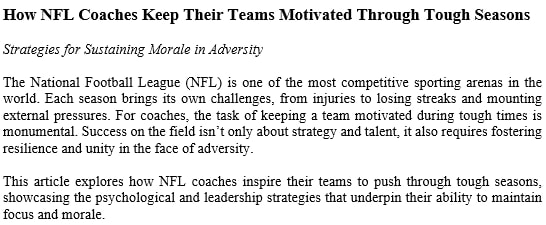How NFL Coaches Keep Their Teams Motivated Through Tough Seasons

How NFL Coaches Keep Their Teams Motivated Through Tough Seasons
Strategies for Sustaining Morale in Adversity
The National Football League (NFL) is one of the most competitive sporting arenas in the world. Each season brings its own challenges, from injuries to losing streaks and mounting external pressures. For coaches, the task of keeping a team motivated during tough times is monumental. Success on the field isn’t only about strategy and talent, it also requires fostering resilience and unity in the face of adversity.
This article explores how NFL coaches inspire their teams to push through tough seasons, showcasing the psychological and leadership strategies that underpin their ability to maintain focus and morale.
1. Understanding the Weight of Adversity
Every team faces tough periods, whether it’s due to injuries, unexpected losses, or off-field distractions. For NFL coaches, the ability to manage these challenges while maintaining a positive team culture is crucial. Coaches serve as leaders, motivators, and sometimes as counsellors, helping players navigate the emotional and mental toll of a gruelling season.
The stakes are high. A losing streak can demoralise a team, lead to infighting, and even erode the trust between players and coaches. Effective leaders address these issues proactively, fostering an environment where setbacks become opportunities for growth.
2. Emphasising a Team-First Mentality
One of the primary ways coaches maintain motivation is by instilling a team-first culture. This mind-set prioritises collective goals over individual accolades, fostering unity even during challenging times.
• Focus on Brotherhood: Many coaches emphasise the concept of “family,” urging players to support one another both on and off the field. This sense of camaraderie helps players feel valued and committed to the group.
• Shared Accountability: By encouraging everyone to take ownership of their roles, coaches ensure that players remain focused on their responsibilities, even when results aren’t going their way.
3. Leading by Example
NFL coaches are under constant scrutiny, and their demeanour can set the tone for the entire organisation. A composed, resilient coach demonstrates to players how to handle adversity with grace.
• Maintaining Composure: Coaches like Bill Belichick and Tony Dungy are known for their calm demeanour, even in high-pressure situations. This steadiness reassures players and prevents panic from spreading through the locker room.
• Demonstrating Hard Work: When coaches show dedication and effort in their own roles, it inspires players to mirror that commitment.
4. Keeping the Message Consistent
During tough times, it’s easy for a team to lose focus or question their goals. Successful coaches keep their messaging consistent, reinforcing the values and principles that guide the team.
• Clear Vision: Coaches often remind players of their long-term objectives, ensuring that short-term setbacks don’t overshadow the bigger picture.
• Weekly Themes: Some coaches use weekly themes or slogans to refocus their teams, tying their preparation to specific goals or challenges.
5. Building Confidence Through Small Wins
In a losing season, building confidence can feel like an uphill battle. Coaches often focus on incremental improvements, celebrating small victories to keep morale high.
• Highlighting Progress: Whether it’s a strong defensive performance or an improvement in execution, coaches draw attention to positive aspects of the team’s play.
• Reframing Challenges: Instead of dwelling on losses, successful leaders frame tough games as learning experiences, shifting the narrative from failure to growth.
6. Fostering Individual Growth
NFL players are driven by a desire to improve and succeed. Coaches who invest in the development of individual players help sustain motivation, even when team results falter.
• One-on-One Communication: Personalised feedback and encouragement help players feel valued and understood.
• Setting Personal Goals: Encouraging players to focus on their individual development provides a sense of purpose beyond the team’s record.
7. Leveraging Motivational Tools
Great coaches understand that inspiration comes in many forms. They use various tools and techniques to keep their players engaged and motivated.
• Inspirational Stories: Sharing stories of perseverance from other athletes or historical figures can resonate with players.
• Guest Speakers: Inviting former players, military leaders, or motivational speakers to address the team can provide fresh perspectives and ignite renewed energy.
• Visualisation Exercises: Coaches sometimes guide players through mental rehearsals of success, helping them build confidence and focus.
8. Keeping Practices Competitive and Fun
When the grind of the season starts to wear on players, mixing up routines can reignite their passion for the game.
• Introducing New Drills: Fresh, engaging drills break up monotony and challenge players in new ways.
• Encouraging Competition: Adding competitive elements to practices, such as mini-games or position-based challenges, keeps players sharp and invested.
9. Encouraging Open Communication
A lack of communication can lead to misunderstandings and fractured relationships within a team. Coaches who foster an open dialogue create an environment of trust and mutual respect.
• Listening to Players: Whether it’s through team meetings or individual conversations, coaches who listen to their players’ concerns and ideas build stronger relationships.
• Providing Honest Feedback: Constructive criticism, when delivered with respect, helps players understand their role in the team’s improvement.
10. Resilience Through Leadership
Resilience is often the difference between teams that crumble under pressure and those that persevere. Coaches play a key role in cultivating this resilience.
• Embracing Adversity: Coaches who frame challenges as opportunities for growth instil a mind-set of perseverance in their players.
• Celebrating Effort: Recognising the hard work and determination of the team, regardless of results, reinforces the value of persistence.
Case Studies of Resilient Coaching
• Pete Carroll (Seattle Seahawks): Carroll’s “always compete” mantra has kept his teams motivated through highs and lows. His emphasis on positivity and continuous improvement creates a culture of resilience.
• Mike Tomlin (Pittsburgh Steelers): Known for his unwavering confidence, Tomlin excels at motivating players during tough stretches. His ability to adapt and inspire has led to consistent success.
Conclusion: The Art of Sustained Motivation
Keeping an NFL team motivated through tough seasons is as much an art as it is a science. It requires a blend of emotional intelligence, strategic thinking, and relentless optimism.
The greatest NFL coaches understand that adversity is inevitable, but failure is not. By fostering unity, focusing on individual and team growth, and leading with purpose, they inspire their teams to rise above challenges. Their ability to maintain motivation, even in the face of difficulty, is a testament to their leadership and the enduring power of belief.
Source link




